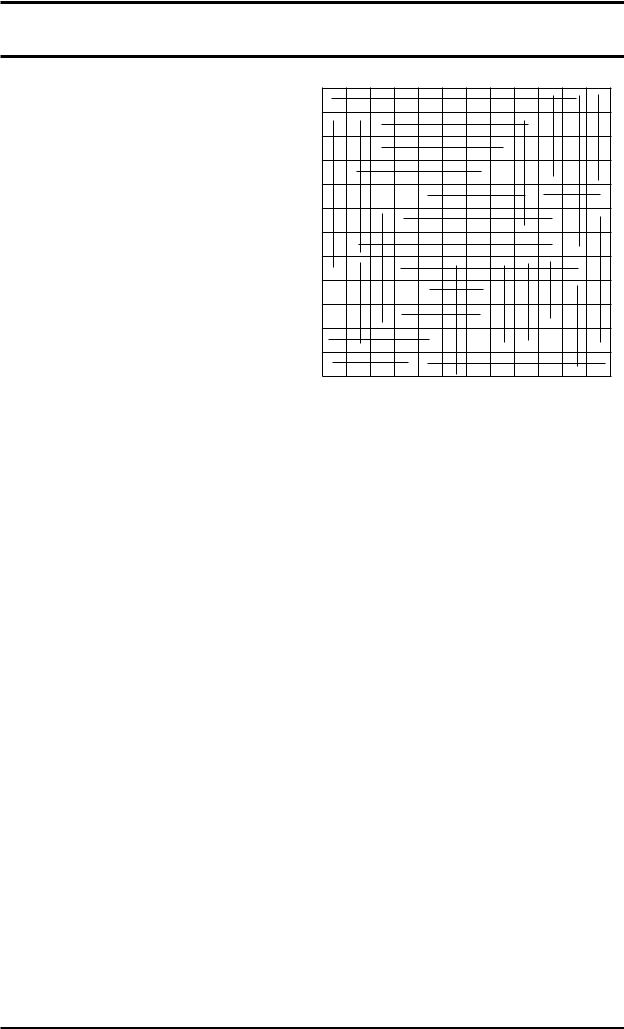
- •Introduction
- •Workbook contents
- •Phrasal verbs
- •Opposites 2
- •Abbreviations
- •Symptoms & common illnesses 1
- •Symptoms & common illnesses 2
- •Diagnosis
- •How it works
- •Instruments and equipment
- •Chemistry
- •Anagrams 1
- •Parts of the body crossword 1
- •Communicative crossword 1 sheet A
- •Communicative crossword 1 sheet B
- •Anagrams 2
- •Word search
- •Communicative crossword 2 sheet A
- •Communicative crossword 2 sheet B
- •Parts of the body crossword 2
- •Gap fill crossword
- •Communicative crossword 3 sheet A
- •Communicative crossword 3 sheet B
- •Quiz
- •Vocabulary Record Sheet
- •Answer key

Quiz
How many of these questions can you answer?
1.Name four sources of Vitamin D.
2.Complete the following sentence. "In human anatomy, the hand has a dorsal and a palmar surface, and the foot a dorsal and a __________ surface."
3.What is the difference between myopia and hypermetropia?
4.Which of the following substances are poisonous?
arsenic
cyanide
fructose
glucose
polyunsaturated fat
starch
strychnine
5.Fill the gaps in the sentence with the correct numbers.
"Permanent teeth, otherwise known as adult teeth, are formed of eight incisors, __________
canines, __________ premolars and __________ molars."
6.What is the term for an organisation responsible for overseeing the provision of primary healthcare and the commissioning of secondary care in a district. Key members include GPs, community nurses, social services and lay members?
7.If a patient is living at home and going to a hospital for treatment, is he/she classed as an "inpatient" or an "outpatient"?
8.What is the child's term for the stomach or abdomen?
9.Are the following statements true or false?
[T / F] |
Blood is formed of red and white corpuscles, platelets and plasma. |
[T / F] |
The liver maintains the circulation of the blood around the body by its pumping action. |
[T / F] |
A mastectomy is a surgical operation to deliver a baby by cutting through the abdominal |
wall into the uterus.
10.What is the normal average human body temperature?
11.To which part of the body do words beginning with "gastr-" refer?
12.Formerly, burns were classified by degrees (first-degree burn and second-degree burn). The modern classification is into two categories. What are these categories?
Extension. Work with a partner and write a medical knowledge quiz. Make sure you know the answers. Then ask the questions to another pair of students in the class.
49
For reference see A & C Black Dictionary of Medical Terms (0 7136 7603 5).

Vocabulary Record Sheet
WORD |
CLASS |
NOTES (Translation, definition, example, etc.) |
|
|
|
|
|
|
|
|
|
|
|
|
|
|
|
|
|
|
|
|
|
|
|
|
|
|
|
|
|
|
|
|
|
|
|
|
This page can be photocopied.
50
For reference see A & C Black Dictionary of Medical Terms (0 7136 7603 5).

Answer key
Word-building
Word association 1: missing links (p. 1)
1.body
2.pain
3.bone
4.muscle
5.eye
6.cell
Word formation: nouns (p. 2)
Exercise 1. |
|
|
|
|
|
|
1. |
diagnosis |
2. examination |
3. |
prescription |
||
4. |
suffering |
5. operation |
6. cure |
7. recovery |
||
8. analysis |
9. infection |
10. carrier |
11. replacement |
|||
12. degeneration |
13. |
referral |
|
14. paralysis |
||
15. obstruction |
|
|
|
|
||
Exercise 2.
1.My diagnosis was that the patient had a heart condition.
2.I made a full examination of the patient.
3.I wrote a prescription for a course of antibiotics.
4.He experienced very little suffering.
5.The operation was performed immediately.
6.There is no cure for this disease.
7.He has made a full recovery.
8.The lab made an analysis of the blood sample.
9.We found an infection in the tissue.
10.Ten per cent of the population are thought to be carriers of the bacteria.
11.The patient was given a hip replacement.
12.There has been a degeneration in his condition.
13.The patient was given a referral to a specialist.
14.He suffered paralysis of the arm after the stroke.
15.The blood clot formed an obstruction in the artery.
Two-word expressions (p. 3)
1. heart attack |
2. general anaesthetic |
3. bone marrow |
|||||
4. surgical intervention |
5. primary tooth |
6. |
plastic |
||||
surgery |
7. brain death |
8. bedside manner |
9. allergic |
||||
reaction |
10. clinical trial |
11. malignant tumour |
|||||
12. general |
practitioner |
|
13. |
biological |
clock |
||
14. digestive system 15. balanced diet |
|
|
|||||
Plural formation (p. 4)
1. |
strata |
|
2. feet |
3. fibulae |
4. glomeruli |
||
5. |
abscesses |
6. joints |
|
7. bullae |
|
8. testes |
|
9. septa |
10. oesophagi |
|
11. diagnoses |
|
12. humeri |
||
13. syringes |
14. acetabula |
15. larvae |
|
16. chordae |
|||
17. varices |
|
18. fungi |
|
19. ganglia |
20. villi |
||
21. atria |
|
22. pontes |
|
23. ova |
|
24. bouts |
|
25. cortices or cortexes
Word formation: adjectives (p. 5)
1.The surgeons operated to repair the patient's defective heart valve.
2.His diet is calcium-deficient.
3.She is physically dependent on amphetamines.
4.The doctor noted an excessive amount of bile in the patient's blood.
5.A hypoglycaemic attack can be prevented by eating glucose or a lump of sugar when feeling faint.
6.The vaccine should make you immune to tuberculosis.
7.They have periods when they are completely inactive.
8.His foot is so painful that he can hardly walk.
9.I suffered spinal injuries in the crash.
10.She complained of stiff joints.
Word association 2: partnerships (p. 6)
Exercise 1.
1.administer a drug
2.analyse a sample
3.arrange an appointment
4.burp a baby
5.catch a cold
6.detect an improvement
7.discontinue the treatment
8.ease the pain
9.resist some infections
10.prescribe antibiotics
Exercise 2.
1.The doctor will administer a drug to the patient.
2.She was prescribed antibiotics.
3.As soon as the patient reported severe side-effects, the doctor discontinued the treatment.
4.I've caught a cold from one of my colleagues at work.
5.The laboratory analysed a sample of the food and found traces of bacteria.
6.A healthy body can resist some infections.
7.I would like to arrange an appointment with the dental hygienist for 10.00am tomorrow.
8.She had an injection to ease the pain in her leg.
9.The health visitor advised the new parents to burp the baby after feeding.
10.The nurses detected an improvement in the patient's condition.
Opposites 1: prefixes (p. 7)
Exercise 1. |
|
il- |
ir- |
1. illegal |
1. irreducible |
|
2. irregular |
key Answer
51
For reference see A & C Black Dictionary of Medical Terms (0 7136 7603 5).

Answer key
52
Answer key
im- |
un- |
1. immovable |
1. unconscious |
2. impalpable |
2. uncontrollable |
3. impure |
3. undigested |
|
4. unfit |
|
5. unhealthy |
in- |
6. unhygienic |
1. inactive |
7. unqualified |
2. inadequate |
8. unstable |
3. incoherent |
9. unwell |
4.incompatible
5.incomplete
6.independent
7.indirect
8.infertile
9.inoperable
10.insanitary
11.insoluble
Exercise 2. |
|
|
|
1. unconscious 2. unwell 3. incapable |
4. unhealthy |
||
5. irregular |
6. unfit |
7. unpasteurised |
8. insanitary |
9. unstable |
10. uncontrollable |
|
|
Word formation: verbs (p. 8)
Exercise 1. |
|
|
|
|
|
|
|
1. abuse |
2. admit |
|
3. bandage |
4. blood |
|||
5. breathe |
6. coagulate |
|
7. consult |
|
8. convalesce |
||
9. fertilise |
10. identify |
11. immunise |
12. implant |
||||
13. macerate |
|
14. manage |
15. occur |
16. perspire |
|||
17. |
prepare |
|
18. |
provide |
|
19. reabsorb |
|
20. |
regenerate |
21. register |
22. regurgitate |
||||
23. |
rehabilitate |
24. reproduce |
25. resuscitate |
||||
26. sedate |
|
27. stammer |
28. stitch |
29. suppress |
|||
30. sweat |
|
|
|
|
|
|
|
Word association 3: mind maps (p. 9)
Exercise 1. |
|
|
|
|
|
1. operating theatre |
2. theatre nurse |
3. A&E |
|||
department |
4. major surgery |
5. surgeon |
6. local |
||
anaesthetic |
7. consultant 8. heart surgery |
9. scrub |
|||
up |
10. surgery |
|
|
|
|
Parts of Speech
Nouns (p. 10)
1. allergy |
2. paroxysms |
3. overdose |
4. surgery |
|
5. course |
6. recurrence |
7. tendency |
8. examination |
|
9. injection |
10. exercise |
11. ambulance |
12. intake |
|
13. biopsy |
14. consent |
15. progress |
16. treatment |
|
17. excess |
18. accident |
19. vaccination |
20. rash |
|
Adjectives 1 (p. 11)
1. safe |
2. poisonous |
3. compatible |
4. inoperable |
|||||||
5. lethal |
6. inborn |
7. incipient |
8. inactive |
9. severe |
||||||
10. confused |
|
11. |
motionless |
12. |
hygienic |
|||||
13. predisposed |
14. aware |
15. delicate |
16. insanitary |
|||||||
17. depressed |
18. regular |
19. infectious |
20. hoarse |
|||||||
Adjectives 2 (p. 12) |
|
|
|
|
|
|
||||
1. lethal |
|
2. critical |
3. persistent |
4. subjective |
||||||
5. infirm |
6. inflamed |
7. mobile |
8. painful |
9. viable |
||||||
10. deaf |
|
11. premature |
12. excessive |
13. acute |
||||||
14. bedridden |
15. latent |
16. obsessive |
17. tender |
|||||||
18. severed |
19. depressed |
20. harmful |
|
|
|
|||||
Verbs 1 (p. 13) |
|
|
|
|
|
|
|
|||
a) diagnose |
b) treat |
c) cure |
d) endanger |
e) prescribe |
||||||
f) specialise |
g) suffer h) operate |
i) vaccinate |
j) soothe |
|||||||
k) dress |
l) suppress |
|
|
|
|
|
|
|||
Verbs 2 (p. 14) |
|
|
|
|
|
|
|
|||
a) transfer |
b) harm |
c) penetrate |
d) perforate |
|||||||
e) probe |
|
f) save |
g) limp |
h) admit i) prevent |
j) |
|||||
respond |
k) faint |
l) perform |
|
|
|
|
||||
Verbs: past tense ~ regular verbs (p. 15)
1. |
received |
|
2. strained |
3. recovered |
|
4. fainted |
||
5. required |
6. suffered |
7. adapted |
8. developed |
|||||
9. fractured |
10. reacted |
11. weighed |
12. prolonged |
|||||
13. aggravated |
14. examined |
15. trembled |
||||||
Verbs: mixed tenses (p. 16) |
|
|
||||||
1. |
visit |
2. overcame |
|
3. rebuilt |
4. undergone |
|||
5. |
froze |
6. bruised |
|
7. measures |
8. expelled |
|||
9. |
hurting |
|
10. heal |
|
11. burnt |
12. controls |
||
13. amputated |
14. bitten |
15. progressing |
|
|||||
Phrasal verbs (p. 17) |
|
|
|
|
|
|||
1. got over |
2. looking after |
3. picked up |
4. drops |
|||||
off |
5. passed out |
6. broke down |
7. takes after |
|||||
8. take off |
9. bringing up |
10. got around |
11. give |
|||||
up |
12. knocked out |
13. propped up |
14. go down |
|||||
15. coughing up |
|
|
|
|
|
|||
Verbs: active/passive (p. 18)
1.A rise in the patient's pulse was noticed by the nurse.
2.He is being allowed by the consultant to watch the operation.
3.The tablets are sold by all chemists.
4.Appendicitis was diagnosed by the doctor.
For reference see A & C Black Dictionary of Medical Terms (0 7136 7603 5).

Answer key
5.The injured person was comforted by the paramedics until the ambulance arrived.
6.The twins were delivered by the midwife.
7.An excess of hormones was being produced by the gland.
8.He was very well looked after in hospital.
9.The tissue was examined under the microscope.
10.I was given an unpleasant mixture to drink by the doctor.
11.The lotion cannot be taken orally.
12.The workers were poisoned by toxic fumes.
13.A rise in cases of whooping cough is being predicted by doctors.
14.The body's natural instinct to reject the transplanted tissue is suppressed by the drug.
Adverbs (p. 19)
1.The bandage was loosely tied around her wrist.
2.Mentally, she is very advanced for her age.
3.If the patient sweats excessively, it may be necessary to cool his body with cold compresses.
4.The tumour is awkwardly placed and not easy to reach.
5.She manages all her patients very efficiently.
6.The relief team urgently requires more medical supplies.
7.This is a mildly antiseptic solution.
8.Physically, he is very weak, but his mind is still alert.
9.He became ill immediately after he came back from holiday.
10.The herb can be used medicinally.
11.He has been working as a doctor only for a fairly short time.
12.Her breathing was severely affected.
Prepositions (p. 20)
1.The hospital has installed new apparatus
|
through^ the physiotherapy department. |
in |
|
2. |
Her lips were cracked of^ the cold. |
from |
|
3.The boy's little toe was crushed^ the door. by
4.The tissue was examined on ^ the microscope. under
5.It is important that needles used at^ injections should be sterilised. for
6. |
He is recovering from a bout^ flu. |
of |
7.She was given to a pain-killing injection.
8.Some types of wool can irritate to the skin.
9.This report quotes the number of cases of cervical cancer from^ thousand patients tested. per
10.The doctor put the patient to sleep within a strong narcotic.
11.She burnt her hand at^ the hot frying pan. on
12.We have no spare beds on^ the hospital at the moment. in
13.He will have an operation to remove of an ingrowing toenail.
14.Please ensure that the patient takes of his medicine.
Pronunciation
Word stress 1 (p. 21)
Group A: hospital regular exercise alcohol minimum haemorrhage operate theatre serious painkillers positive medical history
Group B: admitted improvement condition develop injection equipment allergic reaction prescription
infection opinion |
|
|
|
|
|
|||
Group C: recommend |
reassure |
incomplete |
||||||
Word stress 2 (p. 22) |
|
|
|
|||||
Exercise 1. |
|
|
|
|
|
|
|
|
1. |
complication |
|
|
2. paralysis |
3. |
emergency |
||
4. |
respirator |
5. |
operation |
6. |
anaesthetic |
|||
7. |
disposable |
8. |
intolerance |
9. |
circulation |
|||
10. coordinate |
11. experiment |
12. malignancy |
||||||
13. responsible |
|
14. Analysis |
15. compatible |
|||||
16. saturated |
17. demonstrated |
18. dehydration |
||||||
19. communicate |
20. Penicillin |
|
|
|
||||
Exercise 2. |
|
|
|
|
|
|
|
|
|
|
|
|
|
|
|
||
|
|
|
A |
B |
C |
|
||
|
|
|
|
|
|
|
|
|
anaesthetic |
|
|
|
|
|
x |
|
|
|
|
|
|
|
|
|
|
|
analysis |
|
|
|
|
x |
|
|
|
|
|
|
|
|
|
|
|
|
circulation |
|
|
|
|
|
x |
|
|
|
|
|
|
|
|
|
|
|
communicate |
|
|
|
|
x |
|
|
|
|
|
|
|
|
|
|
|
|
compatible |
|
|
|
|
x |
|
|
|
|
|
|
|
|
|
|
|
|
complication |
|
|
|
|
|
x |
|
|
|
|
|
|
|
|
|
|
|
coordinate |
|
|
|
|
x |
|
|
|
|
|
|
|
|
|
|
|
|
dehydration |
|
|
|
|
|
x |
|
|
|
|
|
|
|
|
|
|
|
demonstrated |
|
|
x |
|
|
|
|
|
|
|
|
|
|
|
|
|
|
disposable |
|
|
|
|
x |
|
|
|
|
|
|
|
|
|
|
|
|
emergency |
|
|
|
|
x |
|
|
|
|
|
|
|
|
|
|
|
|
experiment |
|
|
|
|
x |
|
|
|
|
|
|
|
|
|
|
|
|
intolerance |
|
|
|
|
x |
|
|
|
|
|
|
|
|
|
|
|
|
malignancy |
|
|
|
|
x |
|
|
|
|
|
|
|
|
|
|
|
|
operation |
|
|
|
|
|
x |
|
|
|
|
|
|
|
|
|
|
|
paralysis |
|
|
|
|
x |
|
|
|
|
|
|
|
|
|
|
|
|
penicillin |
|
|
|
|
|
x |
|
|
|
|
|
|
|
|
|
|
|
respirator |
|
|
x |
|
|
|
|
|
|
|
|
|
|
|
|
|
|
responsible |
|
|
|
|
x |
|
|
|
|
|
|
|
|
|
|
|
|
saturated |
|
|
x |
|
|
|
|
|
|
|
|
|
|
|
|
|
|
key Answer
53
For reference see A & C Black Dictionary of Medical Terms (0 7136 7603 5).

Answer key
54
Answer key
Present simple (p. 23)
Group A: |
coughs |
|
helps |
panics |
beats |
sleeps |
||
wakes |
counteracts |
operates |
regulates |
|
||||
Group B: |
breathes |
examines |
recommends |
|||||
prescribes |
relieves |
|
suffers |
controls |
cures kills |
|||
Group C: |
|
sneezes |
reduces |
catches |
rises |
analyses |
||
diagnoses |
relaxes |
|
releases |
|
increases |
|
||
Past tense (p. 24) |
|
|
|
|
|
|||
Group A: |
reduced |
|
coughed |
replaced |
mixed |
|||
dressed |
|
increased |
|
noticed |
dropped |
|
|
|
Group B: diagnosed |
improved |
sneezed prescribed |
||||||
cured |
sterilised |
probed |
|
|
|
|
||
Group C: |
vaccinated |
consulted |
recommended |
|||||
prevented |
operated |
disinfected |
treated |
|||||
preceded |
|
|
|
|
|
|
|
|
Vocabulary in Context
Good advice (p. 25)
1. g) |
8. f) |
2. k) |
9. n) |
3. d) |
10. b) |
4. e) |
11. a) |
5. l) |
12. i) |
6. j) |
13. c) |
7. h) |
14. m) |
Multiple meanings (p. 26)
1. patient 2. fit |
3. focus |
4. notice |
5. turn |
6. light |
|
7. cold |
8. focus |
9. turn |
10. patient 11. notice |
||
12. fit |
13. turn |
14. fit 15. light |
16. focus |
17. fit |
|
18. cold |
19. light |
|
|
|
|
Odd one out (p. 27)
1.bleeding; the others are words which describe types of pain
2.liver; you have two of all the others
3.forearm; the others are all joints
4.face; the others are all specifically sense organs
5.patient; the others are all jobs
6.bandage; the others are all instruments
7.supination; the others are all connected to breathing
8.eyelids; the others are all eye conditions
9.relapse; the others all mean to return to normal after an illness
10.palm; the others are all parts of the eye
11.vertebral column; the others are all part of the ear
12.aluminium; the others are all normally found in the body
13.wound; the others refer principally to damage to
bones
14.metacarpal bone; the others are all in the skull
15.pancreas; the others deal with blood
16.taste; the others are all physical actions
17.hernia; the others relate to the liver
18.diabetes; the others are all part of the skin
Body parts - categories (p. 28)
abdomen - torso |
knuckle - hand |
Achilles tendon - foot |
lip - head |
ankle - leg (or foot) |
nail - hand (or foot) |
buttock - torso |
navel - torso |
calf - leg |
neck - torso |
chest - torso |
nipple - torso |
chin - head |
nose - head |
ear - head |
palm - hand |
elbow - arm |
rib - torso |
eye - head |
scalp - head |
eyebrow - head |
shoulder - torso (or arm) |
eyelash - head |
sole - foot |
eyelid - head |
temple - head |
finger - hand |
thigh - leg |
forearm - arm |
thumb - hand |
forehead - head |
toe - foot |
gum - head |
tongue - head |
hip - torso (or leg) |
tooth - head |
knee - leg |
wrist - arm (or hand) |
Opposites 2 (p. 29)
Exercise 1. |
|
|
|
|
|
|
1. |
front |
2. chronic |
3. alive |
4. deteriorate |
5. ill |
|
6. |
closed |
7. minor |
8. increase |
9. rough |
||
10. malignant |
|
|
|
|
||
Exercise 2. |
|
|
|
|
|
|
1. acute |
2. increase |
3. improve |
4. back |
5. rough |
||
6. malignant 7. open |
8. dead |
9. healthy |
10. major |
|||
Abbreviations (p. 30)
1.A & E: Accident & Emergency
2.AIDS: Acquired Immunodeficiency Syndrome
3.BMR: Basal Metabolic Rate
4.CAT: Computerised Axial Tomography
5.CHD: Coronary Heart Disease
6.D & V: Diarrhoea & Vomiting
7.DOA: Dead On Arrival
8.GP: General Practitioner
9.HAV: Hepatitis A Virus
10.HIV: Human Immunodeficiency Virus
11.MI: Motor Neurone Disease
12.OTC: Over The Counter
13.PM: Post Mortem
14.PMA: Progressive Muscular Atrophy
15.PMT: Premenstrual Tension
16.RQ: Respiratory Quotient
17.RSI: Repetitive Strain Injury
For reference see A & C Black Dictionary of Medical Terms (0 7136 7603 5).

Answer key
18.SAD: Seasonal Affective Disorder
19.SIDS: Sudden Infant Death Syndrome
20.STI: Sexually Transmitted Infection
21.TB: Tuberculosis
22.TBI: Total Body Irradiation
23.UV: Ultraviolet
24.VDH: Valvular Disease of the Heart
25.WHO: World Health Organization
Symptoms & common illnesses 1 (p. 31)
1. |
influenza |
2. rubella |
3. coryza |
4. varicella |
5. |
rubeola |
6. infectious |
parotitis |
7. pertussis |
8. |
allergic rhinitis |
|
|
|
Symptoms & common illnesses 2 (p. 32)
Exercise 1.
1.Chickenpox is the same as varicella
2.A cold is the same as coryza
3.The flu is the same as influenza
4.German measles is the same as rubella
5.Hay fever is the same as allergic rhinitis
6.Measles is the same as rubeola
7.Mumps is the same as infectious parotitis
8.Whooping cough is the same as pertussis
Exercise 2. |
|
|
|
|
|
|
|
1. hay fever |
2. German measles 3. whooping cough |
||||||
4. flu |
5. mumps |
6. chickenpox |
|
|
|||
Diagnosis (p. 33) |
|
|
|
|
|||
1. epilepsy 2. gangrene |
3. cataracts |
4. Parkinson's |
|||||
disease |
5. tuberculosis |
6. cystic fibrosis |
|
7. cirrhosis |
|||
8. diphtheria |
9. cerebral palsy |
10. gastroenteritis |
|||||
How it works (p.34) |
|
|
|
|
|||
1. d) |
|
|
10. h) |
|
|
|
|
2. k) |
|
|
11. p) |
|
|
|
|
3. g) |
|
|
12. q) |
|
|
|
|
4. m) |
|
|
13. c) |
|
|
|
|
5. r) |
|
|
14. o) |
|
|
|
|
6. a) |
|
|
15. l) |
|
|
|
|
7. b) |
|
|
16. j) |
|
|
|
|
8. f) |
|
|
17. i) |
|
|
|
|
9. n) |
|
|
18. e) |
|
|
|
|
Instruments and equipment (p. 35) |
|
|
|||||
1. wheelchair |
|
2. scalpel |
3. probe |
|
4. forceps |
||
5. curette |
6. pipette |
7. tourniquet |
8. hook |
||||
9. drain |
|
10. gag |
11. syringe |
|
12. catheter |
||
13. bandage |
14. sling |
15. stretcher |
|
16. splint |
|||
17. stethoscope |
18. thermometer |
|
|
||||
Chemistry (p. 36)
1.Na, sodium, (e) the basic substance in salt
2.Ca, calcium, (p) metallic element which is the major component of bones and teeth
3.Pb, lead, (l) heavy soft metallic element which is poisonous in compounds
4.Ti, titanium, (n) light metallic element which does not corrode
5.Ba, barium, (d) used as a contrast when taking X-ray photographs of soft tissue
6.Zn, zinc, (s) white metallic trace element
7.Fe, iron, (j) an essential part of the red pigment in blood cells, found in liver and eggs
8.Co, cobalt, (f) metallic element which is the basis of a radioactive isotope used to treat cancer
9.Cl, chlorine, (q) powerful greenish gas, used to sterilise water
10.He, helium, (m) very light gas used in combination with oxygen, especially to relieve asthma or sickness caused by decompression
11.S, sulphur, (t) yellow non-metallic element found in some amino acids
12.Au, gold, (r) soft yellow-coloured precious metal, used as a compound in various drugs, and sometimes as a filling for teeth
13.O, oxygen, (h) colourless gas which is present in air and essential to human life
14.H, hydrogen, (k) gas which combines with oxygen to form water
15.HCI, hydrochloric acid, (a) acid found in the gastric juices which helps to break apart the food
16.N, nitrogen, (o) gas which is the main component of air and an essential part of protein
17.HCN, hydrocyanic acid, (b) acid which forms cyanide
18.C, carbon, (i) one of the common non-metallic elements which is an essential component of living matter and organic chemical compounds
19.N2O, nitrous oxide, (g) colourless gas with a sweet smell, used in combination with other gases as an anaesthetic in dentistry and surgery
20.C10H14N2, nicotine, (c) main alkaloid substance found in tobacco
key Answer
55
For reference see A & C Black Dictionary of Medical Terms (0 7136 7603 5).

Answer key
Answer key
Puzzles & Quizzes
Anagrams 1 (p. 37)
1.Respiration
2.Allergy
3.Daughter
4.Incision
5.Operation
6.Gerontology
7.Relapse
8.Apparatus
9.Prescribe
10.Hospital
11.Exercise
12.Resistance
Parts of the body crossword 1 (p. 38)
1 |
|
|
|
|
2 |
3 |
|
|
4 |
|
5 |
K |
N |
E |
E |
|
S |
T |
O |
M |
A |
C |
H |
|
|
|
|
|
|
|
|
|
|
|
|
I |
|
|
|
|
|
R |
|
|
O |
|
U |
|
|
|
|
|
|
|
|
|
|
|
|
6 |
|
7 |
|
|
|
|
|
|
|
|
|
D |
U |
O |
D |
E |
N |
U |
M |
|
R |
|
M |
|
|
|
|
|
|
|
|
|
|
|
|
N |
|
R |
|
|
|
N |
|
|
T |
|
E |
|
|
|
|
|
|
|
|
|
|
|
|
8 |
|
|
|
9 |
|
|
|
10 |
|
|
|
E |
L |
B |
O |
W |
|
K |
|
H |
A |
I |
R |
|
|
|
|
|
|
|
|
|
|
|
|
Y |
|
I |
|
A |
|
|
|
|
|
|
U |
|
|
|
|
|
|
|
|
|
|
|
|
|
11 |
|
|
|
|
|
12 |
|
13 |
|
|
|
A |
T |
R |
I |
A |
|
L |
U |
N |
G |
S |
|
|
|
|
|
|
|
|
|
|
|
|
|
|
|
|
S |
|
|
I |
|
A |
|
|
|
|
|
|
|
|
|
|
|
|
|
|
|
|
14 |
|
|
|
|
15 |
|
|
|
16 |
|
|
Z |
|
T |
|
|
V |
E |
I |
N |
S |
|
|
|
|
|
|
|
|
|
|
|
|
|
17 |
|
|
|
|
|
|
|
|
|
|
|
E |
Y |
E |
|
|
|
E |
|
L |
|
K |
|
|
|
|
|
|
|
|
|
|
|
|
|
|
|
|
18 |
|
|
|
|
|
|
|
|
|
G |
|
H |
E |
A |
R |
T |
|
|
U |
|
|
|
|
|
|
|
|
|
|
|
|
19 |
|
|
|
|
|
|
|
|
20 |
|
|
J |
|
O |
|
A |
|
|
|
|
K |
|
L |
|
|
|
|
|
|
|
|
|
|
|
|
|
|
|
|
21 |
|
|
|
|
|
|
|
U |
|
M |
|
N |
E |
U |
R |
O |
N |
|
L |
|
|
|
|
|
|
|
|
|
|
|
|
22 |
|
|
23 |
|
|
|
|
|
|
|
|
G |
L |
A |
N |
D |
|
|
|
|
U |
|
|
|
|
|
|
|
|
|
|
|
|
|
|
|
|
|
|
|
24 |
|
|
|
|
|
|
U |
|
|
E |
|
F |
A |
T |
|
C |
|
|
|
|
|
|
|
|
|
|
|
|
|
|
|
|
|
|
|
|
|
|
25 |
|
|
|
L |
|
|
R |
|
O |
|
|
S |
K |
I |
N |
|
|
|
|
|
|
|
|
|
|
|
|
A |
|
|
V |
|
O |
|
|
|
L |
|
|
|
|
|
|
|
|
|
|
|
|
|
|
26 |
|
|
|
|
|
|
|
|
27 |
|
|
R |
E |
C |
E |
P |
T |
O |
R |
|
E |
A |
R |
|
|
|
|
|
|
|
|
|
|
|
|
56
For reference see A & C Black Dictionary of Medical Terms (0 7136 7603 5).

Answer key
Anagrams 2 (p. 41)
1.Cerebrum
2.Average
3.Reaction
4.Behaviour
5.Observe
6.Hiccup
7.Yawn
8.Deteriorate
9.Relaxation
10.Awake
11.Theatre
12.Emetic
Parts of the body crossword 2 (p. 45)
Word search (p.42)
P A T H O L O G I |
S T W |
|||
E C N O S T R I L P R O |
||||
N L S C R E |
E N I O I M |
|||
D I M M U N E |
A V T C B |
|||
E N B C S L I D E W |
E T |
|||
M I L B E D S O R E P H |
||||
I C O R T I S O N E S E |
||||
C H C P A N C R E A S R |
||||
D O U E T A P A A G T N |
||||
F S M L I S P S S E A I |
||||
A T O N Y A G H E H K A |
||||
I R O N A L L E R G E N |
||||
1 |
|
|
|
2 |
|
3 |
|
4 |
|
|
|
S |
I |
N |
E |
W |
|
R |
|
B |
O |
N |
E |
|
|
|
|
|
|
|
|
|
|
|
|
K |
|
|
|
R |
|
A |
|
R |
|
|
|
|
|
|
|
|
|
|
|
|
|
|
|
5 |
|
6 |
|
|
|
|
|
|
|
|
7 |
E |
A |
R |
|
I |
|
M |
|
A |
|
|
N |
|
|
|
|
|
|
|
|
|
|
|
|
L |
|
E |
|
S |
|
U |
|
I |
|
|
O |
|
|
|
|
|
|
|
|
|
|
|
|
|
|
|
|
|
|
8 |
|
|
9 |
|
|
E |
|
T |
|
T |
|
S |
E |
N |
S |
E |
S |
|
|
|
|
|
|
|
|
|
|
|
|
T |
|
I |
|
|
|
|
|
|
I |
|
E |
|
|
|
|
|
|
|
|
|
|
|
|
|
|
|
|
|
|
10 |
|
|
|
|
|
O |
|
N |
|
|
|
P |
|
|
N |
|
|
|
|
|
|
|
|
|
|
|
|
|
|
|
|
11 |
12 |
|
|
|
|
|
|
|
|
N |
|
A |
N |
K |
L |
E |
|
|
U |
|
|
|
|
|
|
|
|
|
|
|
|
|
|
|
|
|
|
|
|
13 |
|
|
|
|
|
|
|
|
E |
|
|
C |
H |
E |
S |
T |
|
|
|
|
|
|
|
|
|
|
|
|
|
|
|
|
C |
|
|
T |
|
|
|
|
|
|
|
|
|
|
|
|
|
|
|
|
|
14 |
|
15 |
|
|
|
16 |
|
|
17 |
|
|
B |
A |
C |
K |
|
|
O |
V |
A |
R |
Y |
|
|
|
|
|
|
|
|
|
|
|
|
|
|
|
|
|
18 |
|
|
|
|
|
|
19 |
R |
|
O |
|
F |
|
R |
|
|
H |
|
S |
|
|
|
|
|
|
|
|
|
|
|
|
|
|
20 |
|
|
|
|
|
|
|
|
|
O |
|
C |
O |
L |
L |
A |
R |
B |
O |
N |
E |
|
|
|
|
|
|
|
|
|
|
|
|
N |
|
C |
|
A |
|
L |
|
|
M |
|
P |
|
|
|
|
|
|
|
|
|
|
|
|
|
|
|
|
|
|
|
21 |
|
|
|
|
C |
|
Y |
|
B |
|
|
R |
I |
B |
|
T |
|
|
|
|
|
|
|
|
|
|
|
|
|
|
|
|
|
22 |
|
|
|
|
|
|
H |
|
X |
|
|
T |
|
O |
|
O |
|
U |
|
|
|
|
|
|
|
|
|
|
|
|
U |
|
|
|
|
O |
|
O |
|
I |
|
M |
|
|
|
|
|
|
|
|
|
|
|
|
|
|
|
|
23 |
|
|
|
|
|
|
|
S |
|
|
|
F |
E |
E |
T |
|
D |
|
|
|
|
|
|
|
|
|
|
|
|
|
|
key Answer
57
For reference see A & C Black Dictionary of Medical Terms (0 7136 7603 5).

Answer key
Answer key
Gap fill crossword (p. 46)
1 |
|
|
2 |
|
|
|
|
|
3 |
|
4 |
I |
N |
V |
E |
N |
T |
E |
D |
|
B |
|
O |
|
|
|
|
|
|
|
|
|
|
|
|
N |
|
|
X |
|
|
|
|
|
I |
|
R |
|
|
|
|
|
|
|
|
|
|
|
|
5 |
|
|
|
|
|
6 |
|
|
|
|
|
S |
A |
M |
P |
L |
E |
S |
|
|
R |
|
I |
|
|
|
|
|
|
|
|
|
|
|
|
|
|
|
|
|
|
7 |
|
|
|
|
|
E |
|
|
E |
|
|
L |
I |
S |
T |
|
G |
|
|
|
|
|
|
|
|
|
|
|
|
|
|
|
8 |
|
|
|
|
|
|
|
|
R |
|
|
N |
O |
S |
E |
E |
|
H |
|
I |
|
|
|
|
|
|
|
|
|
|
|
|
T |
|
|
S |
|
|
E |
|
|
|
|
N |
|
|
|
|
|
|
|
|
|
|
|
|
9 |
|
|
|
|
|
10 |
|
|
|
|
|
E |
Q |
U |
I |
P |
|
P |
H |
O |
B |
I |
A |
|
|
|
|
|
|
|
|
|
|
|
|
|
|
|
|
|
11 |
|
|
|
|
|
|
D |
|
|
V |
|
R |
|
|
|
|
|
L |
|
|
|
|
|
|
|
|
|
|
|
|
|
12 |
|
13 |
|
|
|
|
|
|
|
|
|
P |
|
E |
N |
E |
R |
G |
Y |
|
|
|
|
|
|
|
|
|
|
|
|
|
|
|
|
|
|
|
|
|
|
|
|
14 |
|
15 |
|
U |
|
|
|
A |
|
|
|
S |
E |
T |
|
|
|
|
|
|
|
|
|
|
|
|
16 |
|
|
|
|
17 |
|
|
|
|
|
|
B |
L |
E |
D |
|
C |
O |
U |
G |
H |
|
U |
|
|
|
|
|
|
|
|
|
|
|
|
|
|
|
|
|
|
|
|
|
18 |
|
|
|
S |
|
|
|
T |
|
|
|
E |
A |
R |
|
|
|
|
|
|
|
|
|
|
|
|
|
19 |
20 |
|
|
|
|
21 |
|
|
|
|
|
E |
M |
A |
C |
I |
A |
T |
E |
D |
|
N |
|
|
|
|
|
|
|
|
|
|
|
|
22 |
|
|
|
|
|
|
|
|
|
23 |
|
C |
|
A |
|
|
O |
|
I |
|
|
S |
|
|
|
|
|
|
|
|
|
|
|
|
|
24 |
|
|
|
25 |
|
|
|
|
|
|
|
A |
P |
P |
O |
I |
N |
T |
M |
E |
N |
T |
|
|
|
|
|
|
|
|
|
|
|
|
|
S |
|
P |
|
Q |
|
|
E |
|
|
A |
|
|
|
|
|
|
|
|
|
|
|
|
|
|
|
|
|
|
|
|
|
26 |
|
|
|
E |
|
E |
|
|
|
|
|
L |
I |
F |
T |
|
|
|
|
|
|
|
|
|
|
|
|
27 |
|
|
|
|
|
|
|
|
|
|
|
S |
E |
D |
A |
T |
I |
O |
N |
|
|
F |
|
|
|
|
|
|
|
|
|
|
|
|
|
Quiz (p. 49)
1.butter, egg yolk, fish liver oils, oily fish, yeast (Vitamin D is also produced in the skin when exposed to sunlight.)
2.plantar
3.Myopia is a condition where the patient can see clearly objects which are close, but not ones which are far away, whereas with hypermetropia, the patient sees more clearly objects which are a long way away, but cannot see objects which are close. (More common words for myopia are shortsightedness or nearsightedness. A more common word for hypermetropia is longsightedness.)
4.arsenic; cyanide; strychnine
5.four canines, eight premolars and twelve molars
6.primary care group
7.outpatient
8.tummy
9.True, False (The organ described here is the heart), False (The operation described here is a caesarean.)
10.about 37° Celsius or 98° Fahrenheit
11.stomach
12.deep; superficial
58
For reference see A & C Black Dictionary of Medical Terms (0 7136 7603 5).
